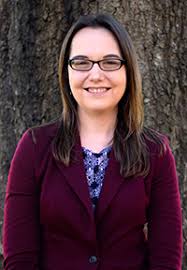We believe that science and education work best in collaborative environments. Our curriculum and teaching philosophy are motivated by this principle. Our team is located at a variety of public and private institutions across the US, including large research universities, medium comprehensive universities, and small liberal arts colleges. Although we are divided by geography, we utilize modern networking tools to continue our collaboration on curricular design, teaching strategies, and discipline-based education research. You can usually find us at the annual conference of the National Association of Biology Teachers (NABT).
Tarren Shaw
Department of Biology, University of Oklahoma – Norman, OK
 I use several of the IBIS lecture scenarios and assessments in a large (400+) introductory biology course for STEM majors. Students enjoy the storyline provided by the scenario based lecture modules, and the opportunity to apply concepts during case studies. The companion laboratory section uses the IBIS lab manual and curriculum exclusively. I use many of the IBIS Peer Mentor training resources to train and advise the GTAs that are responsible for lab instruction.
I use several of the IBIS lecture scenarios and assessments in a large (400+) introductory biology course for STEM majors. Students enjoy the storyline provided by the scenario based lecture modules, and the opportunity to apply concepts during case studies. The companion laboratory section uses the IBIS lab manual and curriculum exclusively. I use many of the IBIS Peer Mentor training resources to train and advise the GTAs that are responsible for lab instruction.
My primary focus at University of Oklahoma involves undergraduate biology instruction and education research. Whether that be the curricular development and instruction of a large-enrollment Introductory Biology course and its accompanying laboratory, or the impact of technology and peer-led instruction on student learning gains. Regardless, I am interested in developing new pedagogies and applying research-based strategies to increase student learning gains or improve attitudes toward science.
Currently I am a Fellow with the Center for Teaching Excellence at OU. As part of this fellowship I am producing and leading multiple faculty development workshops to encourage the use of active learning instructional and assessment strategies across the university.
Suann Yang
Biology Department, SUNY Geneseo – Geneseo, NY

I am currently using some of the IBIS laboratory curriculum at Geneseo, which is a medium-sized, public liberal arts institution. In addition, the modular, scenario-motivated IBIS curriculum structure inspired me to develop a similar organization for my second-year ecology course. Students learn about fundamental ecological concepts within six framing environmental problems in this lecture-only curriculum. I frequently have students tell me that this way of learning ecology, although different, really does help them to retain information and understand how to apply their knowledge.
Being trained as a community ecologist, my scholarly interests with respect to student learning are focused on how the context of interactions among students influences their attitudes toward their learning experiences. I’m also working on several projects: improving student retention with peer-led workshops, teaching quantitative skills while reducing math anxiety, and developing open educational resources for multidisciplinary sustainability education.
Jeffrey Grim
Biology Department, University of Tampa – Tampa, FL

I use parts of the IBIS curriculum/pedagogy, including selected assessments, topic scenarios, tools for managing student groups, and Peer Mentors in General Biology 1 (BIO 198), General Biology 1 laboratory (BIO 198L), General Physiology (BIO 330), and Cell Biology (BIO 350) at UT, a medium-sized, private, comprehensive university.
My research interest include the exploration and implementation of high-impact learning practices, including support for adoption of active learning and inquiry-based approaches across the curriculum and in interdisciplinary ways. Additionally, I’m interested in issues of retention within majors and across the institution, and how students at institutions of different sizes respond to similar curricular approaches. I am also broadly interested in challenges animals face in maintaining homeostasis in response to abiotic and biotic challenges. My lab is currently studying the the physiological implications of chytrid fungal infections and relationships between gut microbiomes and ecological niches in fishes.
I am currently the Chair of University of Tampa’s Faculty Committee for Undergraduate Research and Inquiry, and I work closely with our Office of Undergraduate Research and Inquiry to facilitate the adoption, assessment, and administration of inquiry-based learning across the University.
Rachel Pigg
Department of Biology, University of Louisville – Louisville, KY
I use some of the IBIS lecture curriculum in my introductory biology course (BIOL 240 Unity of Life and BIOL 242 Diversity of Life). I’m on a team that’s revising the accompanying labs and will be incorporating components of IBIS to inspire student-led inquiry. I will also be utilizing the Peer Mentor training philosophies for preparing graduate teaching assistants to provide real-time feedback on student work as they plan their investigations during lab.
Troy Nash
Department of Biology, Mercer University – Macon, GA

I currently use the IBIS program in BIO 211-212 (Intro Bio I and II) at Mercer University, which is a private, medium, comprehensive research university. Students in BIO 211-212 appreciate the iterative, interleaved nature of the IBIS curriculum and the open-ended laboratory investigations. I am in the process of creating a Peer Mentor system to help support the students in these classes. I am interested in implementing and assessing different types of Peer-Led Team Learning opportunities in Intro Bio courses. I’m also interested in developing mechanisms to increase student resilience and persistence in STEM fields. I’m an HHMI Scientific Teaching Mentor and have helped lead in Summer Institutes for Scientific Teaching at the University of Georgia, the University of Chicago, and the University of Pittsburgh. I am also a member of the Faculty Development Committee at Mercer University, which focuses on increasing evidence-based teaching practices among the faculty.
Project Support
 This project site is supported by Milne Library’s Open Services Team, and designed by Allison Brown, Digital Publishing Services Manager, SUNY Geneseo.
This project site is supported by Milne Library’s Open Services Team, and designed by Allison Brown, Digital Publishing Services Manager, SUNY Geneseo.
